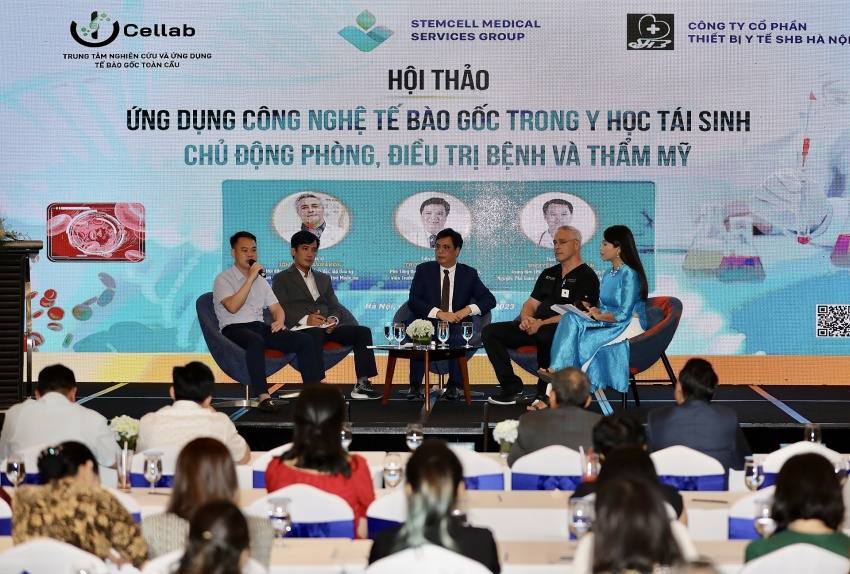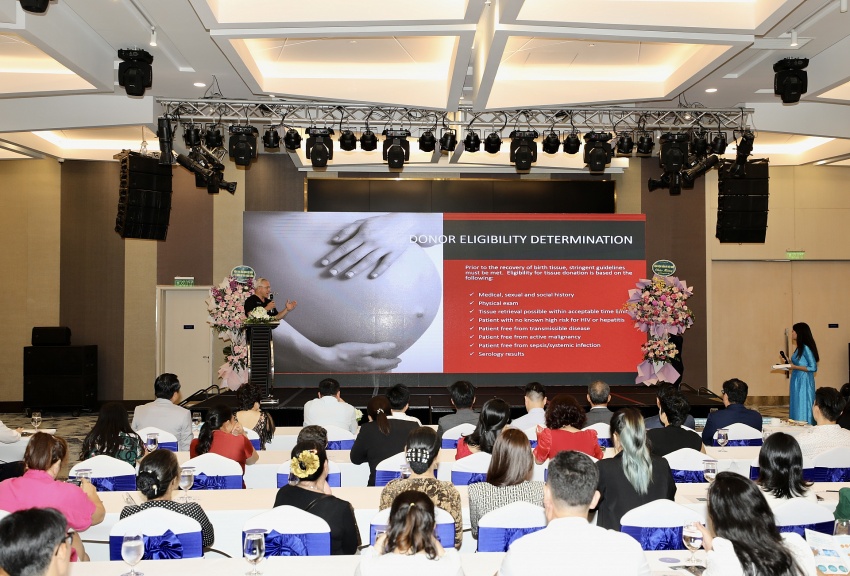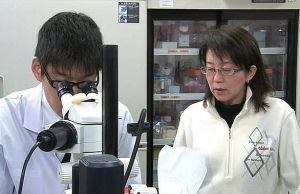Stem cell technology in regenerative medicine - a true global trend
While SCT is still relatively new in Vietnam, it represents a groundbreaking revolution in preventing and treating chronic diseases and improving aesthetics. Its applications are widely practised in the United States, Japan, and Europe.
At a July 30 seminar on the issue co-organised by Stemcell Medical Services Group, SHB Medical Equipment, and the Global Stem Cell Research and Application Centre, experts discussed new tech trends and the application of stem cells, aiming to bring scientific achievements from around the world into practical use to improve the quality of life for Vietnamese people.
 |
The event was attended by leaders of hospitals, organisations, and the business community, as well as numerous healthcare experts and scientists from the United States and Vietnam.
Evaluating the effectiveness of the stem cells that Stemcell Medical Services is developing, Dr. John E. Stavrakov from the Independent Medical Council of the United States said, "Stem cells are the next leap in medicine. They can be compared to transitioning from horses and cars, or to the invention of penicillin."
Stavrakov explained that SCT can treat or potentially help people overcome many diseases. "Therefore, the goal is to bring it everywhere, where people want to be healthy and are trying to avoid issues that the current medical model sometimes cannot solve."
With 10 years of experience in researching and distributing stem cell products that enhance the body's healing abilities in the United States, Stemcell Medical Services has brought stem cell products to four countries with over 500,000 users.
This is the first time the corporation has brought SCT solutions to Vietnam with the goal of applying them to treat joint and bone diseases, cancer, extensive burns, diabetes, and cardiovascular issues, as well as using them for pre- and post-surgical and beauty treatments for patients.
Dr. Truong Hong Son, deputy secretary general of the Vietnam Medical Association, who has spent time researching topics related to SCT, pointed out that with the rapid increase in people suffering from immune, blood pressure, diabetes, cardiovascular, joint, and bone diseases in Vietnam, finding effective treatment methods in regenerative medicine is absolutely necessary.
"When we reach an age where many diseases can appear, we need to use something that can regenerate cells or replace them to extend life. We often talk about lifespan; we extend life, not just existence. This is very important," Dr. Son said.
 |
According to medical experts, stem cells can be obtained from various sources, but those from umbilical cord blood are considered the healthiest, as well as the most adaptable, robust, and capable of self-renewal and rapid repair.
According to Dr. Nguyen Manh Tuan from the Global Stem Cell Research and Application Centre – a strategic partner of the Post Hospital – and former deputy director of Hanoi General Hospital's professional department, SCT is widely used in regenerative medicine and the treatment of chronic diseases.
"For example, in burn treatments, SCT can help produce new tissues to regenerate damaged skin. We can also graft cartilage in ligament injuries and effectively treat chronic liver and heart diseases," Tuan said.
"Unlike conventional treatment methods, SCT treatment involves minimal intervention, so it brings the highest and safest efficacy while preserving the basic characteristics the patients have had since birth. SCT can be considered the therapeutic method of the future, with the current stage being the first step," he added.
 | Japan to start world's first human trial using stem cell to treat Parkinson's Japanese researchers on Monday (Jul 30) announced the world's first human trial using a kind of stem cell to treat Parkinson's disease, building on earlier animal trials. |
 | Innovative treatment for non-small cell lung cancer patients with ALK+ Leading respiratory and oncology experts on August 28 gathered at a scientific conference to discuss advances in the treatments of non-small cell lung cancer (NSCLC) patients with ALK+. |
What the stars mean:
★ Poor ★ ★ Promising ★★★ Good ★★★★ Very good ★★★★★ Exceptional
Themes: Healthcare Platform
- PM outlines new tasks for healthcare sector
- Opella and Long Chau join forces to enhance digestive and bone health
- Hanoi intensifies airport monitoring amid Nipah disease risks
- Cosmetics rules set for overhaul under draft decree
- Policy obstacles being addressed in drug licensing and renewal
Related Contents
Latest News
More News
- Agro-forestry and fisheries exports jump nearly 30 per cent in January (February 09, 2026 | 17:45)
- Canada trade minister to visit Vietnam and Singapore (February 09, 2026 | 17:37)
- New tax incentives to benefit startups and SMEs (February 09, 2026 | 17:27)
- Vietnam forest protection initiative launched (February 07, 2026 | 09:00)
- China buys $1.5bn of Vietnam farm produce in early 2026 (February 06, 2026 | 20:00)
- Vietnam-South Africa strategic partnership boosts business links (February 06, 2026 | 13:28)
- Mondelez Kinh Do renews the spirit of togetherness (February 06, 2026 | 09:35)
- Seafood exports rise in January (February 05, 2026 | 17:31)
- Accelerating digitalisation of air traffic services in Vietnam (February 05, 2026 | 17:30)
- Ekko raises $4.2 million to improve employee retention and financial wellbeing (February 05, 2026 | 17:28)

 Tag:
Tag:



















 Mobile Version
Mobile Version